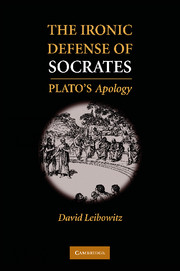Book contents
- Frontmatter
- Contents
- Acknowledgments
- Introduction
- 1 Title and Preliminary Considerations
- 2 Prooemium (17a1–18a6)
- 3 Prothesis (18a7–19a7)
- 4 Defense against the Charges of the First Accusers (19a8–24b2)
- 5 Defense against the Present Accusers (24b3–28b2)
- 6 Second Digression (28b3–34b5)
- 7 Epilogue (34b6–35d8)
- 8 Penalty Section (35e1–38b9)
- 9 Final Speech (38c1–42a5)
- 10 Conclusion
- Short Titles
- Bibliography
- Index
3 - Prothesis (18a7–19a7)
Published online by Cambridge University Press: 05 August 2011
- Frontmatter
- Contents
- Acknowledgments
- Introduction
- 1 Title and Preliminary Considerations
- 2 Prooemium (17a1–18a6)
- 3 Prothesis (18a7–19a7)
- 4 Defense against the Charges of the First Accusers (19a8–24b2)
- 5 Defense against the Present Accusers (24b3–28b2)
- 6 Second Digression (28b3–34b5)
- 7 Epilogue (34b6–35d8)
- 8 Penalty Section (35e1–38b9)
- 9 Final Speech (38c1–42a5)
- 10 Conclusion
- Short Titles
- Bibliography
- Index
Summary
The Charges of the First Accusers
The Most Dangerous Accusers
In the prothesis, or statement of the case, Socrates takes a step that no defense lawyer would recommend: he goes out of his way to multiply the number of charges and accusers against him. It is as though a man on trial for murder took the opportunity to remind the jury that he was suspected of several other crimes as well. Long before Anytus and his followers dragged him into court, says Socrates, he was being slandered by men he calls his “first accusers.” Since these accusers accused him “earlier and much more” than the present ones, he must reply to them first (18e2–4). Their charges – which are altogether untrue (18b2), or at least “no more true” than the present charges (cf. 18b4–6 with 17a3–4 and 17b6–7) – are that Socrates is “a wise man, a thinker on the things aloft, who has investigated all things under the earth, and who makes the weaker speech the stronger” (18b1–c1). The first accusers, we can say, charge him with engaging in natural science and rhetoric. By using the perfect participle (ἀνεζητηκώς), they imply that his investigation of “all” things under the earth, which would include Hades, has been completed (cf. Clouds 187–192); that is, they imply that he has answered the question of what happens to us when we die.
- Type
- Chapter
- Information
- The Ironic Defense of SocratesPlato's Apology, pp. 39 - 48Publisher: Cambridge University PressPrint publication year: 2010



